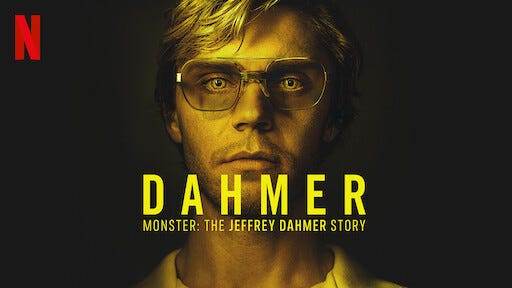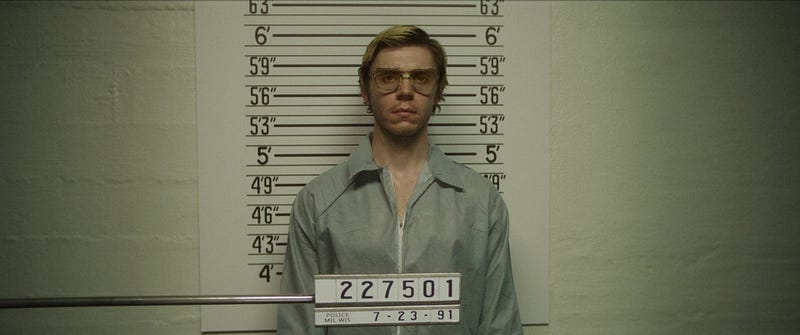Killing for company.

One of the many impressive and redeeming qualities from the latest docudrama to roll from the Netflix production line is that despite the sub title to this horrific and unspeakable dramatisation of the real life of serial killer Jeffrey Dahmer, this isn’t solely his story. His unconscionable and difficult to humanly comprehend murder spree that claimed 17 youthful and innocent lives (the youngest of which was just 14 years of age) is of course the central strand and, for the uninitiated, the dramatised life of a man who, like British serial killer Dennis Nilsen, killed for company as he tried to create “living zombies” and submissive compliant company for his dominant desires before ultimately and despicably cannibalising them when his horrific experiments failed, this real life drama is also very much the story of the one sole survivor, the surviving families enveloped in grief, the traumatised next door neighbour and, particularly, the killer’s father, Lionel Dahmer. It’s also the life of Dahmer’s troubled mother Joyce Flint, his step mother Shari Dahmer and particularly, albeit briefly, the story of Tony Hughes and his friendship with a monster who’s first real human smile and first glimpses of any kind of warmth and humanity are only shown late into this ten part mini-series and all because for the first time Jeffrey Dahmer had finally found the company he craved.
“Killing for Company” is a highly recommended book on the British serial killer Denis Nilsen as is “The Shrine of Jeffrey Dahmer” written by the same author, Brian Masters, and each, together with this Netflix series, coalesce into the same recurring theme of the awkward loner outsider who is so psychopathically disconnected from society that they regard fellow human beings or “the hunt” as described by Dahmer as mere disposable products for their complete control. The unspeakable revelations of Dahmer’s crimes and televised court appearances of 1991 were for me an epochal moment. As a soon to be college leaver I vividly remember seeing this horrific story every day on the morning news in a brave new world of UK breakfast television shows and mid-morning entertainment chat shows now having to compete with the growing market of satellite and cable television. It was also the time of the growing prevalence for books such as Killing for Company noted above and the growing fascination I would have for the life and crimes of numerous serial killers (including the parallels drawn with John Wayne Gacy here) and a periodical magazine here in the UK entitled “Murder Casebook” which was the font of all possible knowledge on the historical murderous psychopaths who blight our collective consciousness.
So I’ve always had a fascination for the lives of these monsters but not a ghoulish or morbid one, more a desire to have a fuller picture of that one defining image that history, and now the internet, defines as the killer or in this case Jeffrey Dahmer. Pick a serial killer of your choosing: Charles Manson, Ted Bundy, Peter Sutcliffe, Richard Ramirez, and you’ll have a defining image in your mind. But who are these creatures? What was their background, childhood and adolescence? What drove them to their unspeakable crimes? How could they dispose and dispense with another human life with such detachment and regularity? In Dahmer’s case: What is the catalyst for drugging and killing 17 innocent people, documenting each one before dismembering his “living zombies”, cannibalising and eating the body parts of the victims whilst living amongst their skeletal remains?

All of which brings us to Evan Peters and his virtuoso performance of the cold dead eyed smile of a monster with his slight lisp and softy spoken demeanour that whilst being disarming was also dangerously unhinged and detached. Peters is mesmerising with an unfathomable detachment eerily reminiscent of the interviews of the real life Dahmer and the ease with which he’d detail his unspeakable crimes with such inhuman detachment. Supporting Peters central performance are the lives Dahmer ruined, blighted or destroyed during his grotesque reign of terror. Penelope Ann Miller excels as his suicidal and depressed mother who is painted as a central reason for her child’s detached depravity and the brilliant Richard Jenkins inhabits the skin of his father and a man wrought with guilt that he too is centrally to blame. All three central roles are worthy of awards nominations and recognitions as are arguably Molly Ringwald and Niecy Nash as his step mother and traumatised next door neighbour respectively.
Through a fractured and non-linear timeline that encompasses the awkward loner’s leaving of college and discharge from the army amid a growing alcoholism and anti social behaviour that warrants numerous entanglements with local police, this is very much Dahmer’s life dramatically writ large but it tells the survivor’s stories too. Five directors and six credited writers, however the yellow brown hue of a colour palette is a constant enveloping background to a wicked tale of a despicable man who killed for company and whilst he, in life, eloquently described his barbaric reasons for doing so, we are now at the end of a three decades long period of hindsight, books, documentaries, podcasts and now this ten part drama series. Yet the story of Jeffrey Dahmer, however well explained, dissected or reasoned remains deeply unconscionable and deeply disturbing.
Thanks for reading. Just for larks as always, and always a human reaction rather than spoilers galore. My three most recently published film and television articles are linked below or there’s well over 100 blog articles (with 300+ individual film reviews) within my archives from which to choose:
“Flight” (2012)
Disappointing addition to the cinematic cannon of Robert Zemeckis.medium.com
“The Walk” (2015)
Astounding true life story through the loving lens of Robert Zemeckis.medium.com
“Cherry” (2021)
A love story that is brilliantly crafted and beautifully grimmedium.com



